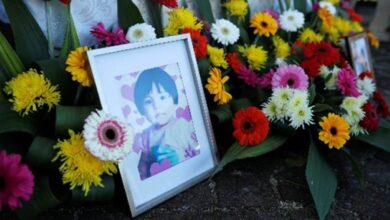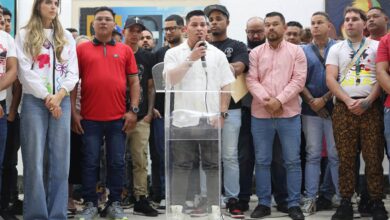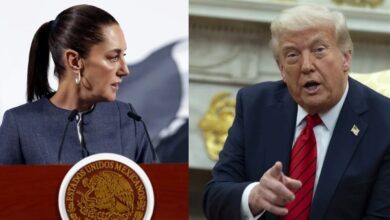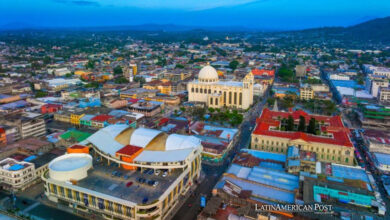State of emergency in Salvadoran prisons
Thousands of inmates in the prison centers of El Salvador are in total confinement, sitting one after the other, handcuffed and unable to move.

El Salvador’s President Nayib Bukele announced strong measures for the country’s prison system. / Photo: twitter.com/OsirisLunaMeza
LatinamericanPost| Juliana Suárez
Listen to this article
Leer en español: Estado de emergencia en las cárceles salvadoreñas
The pandemic has unleashed a pre-existing prison crisis in Latin America, and recent prison riots in El Salvador led President Nayib Bukele to make drastic decisions.
Over the weekend the number of homicides increased in El Salvador, a country where much of the crime and violence in the cities stems from gangs and the confrontations between them. 17 homicides, allegedly ordered from prisons by these tensions, led Nayib Bukele to declare a prison emergency.
This statement was made thanks to intelligence that corroborated that the killings had been organized within some prison centers and empowered the president, as long as the Penitentiary Surveillance judges ratify it. With this decision, the president was trying to keep security at the highest level while investigations continue on the 17 homicides that occurred out of doors.
Bukele has been strong-handed since the pandemic began to spread. His first decision, when the contagions began to reach Central America, was to completely close the country and decree mandatory isolation. Since then, measures have been drastic to try to prevent the spread in a country that may not have great medical capabilities.
Also read: Coronavirus: test are lacking in Latin America
So far, El Salvador has 323 reported cases and 8 deaths. However, the president's decision contradicts the proposed isolation measures in the rest of the country. Still, the president preferred to do it to "teach the gangs a lesson".
Regardless of the consequences of possible human rights violations, the President ordered that inmates be kept 24 hours a day throughout the week in isolation while intelligence is being conducted to find those responsible for the killings. These new actions will affect around 16 thousand gang members in 7 prisons in the country.
El nuevo régimen penitenciario será establecido en los siguientes centros penales:
– Las tres fases de Izalco
– San Francisco Gotera
– Quezaltepeque
– Ciudad Barrios pic.twitter.com/C1pqEMoju7— Osiris Luna Meza (@OsirisLunaMeza) April 27, 2020
Among the actions, cells were sealed so that inmates cannot leave or communicate with other inmates, and thousands of other handcuffed inmates in underwear are sitting one after another without minimum distance. This last decision was made by the president to mix gang members from different groups with each other, despite the fact that they are usually separated to avoid fighting.
Bukele himself and his government have released the images of the overcrowded prisoners to demonstrate El Salvador's strong hand, and that they will not rest until the gangs stop affecting the rest of the population. "This day a regime is established in which the inmates will not have any sun ray visible. There will be no communication and since yesterday, members of different gangs have been in the same cell. Now there are no exclusive penalties," said Osiris Luna Meza, director of the Penal Centers.
Also read Coronavirus: the reality of Latinos in the US
In addition to this, the government issued an official statement stating that the PNC (National Civil Police and members of the army) can “use deadly force against terrorists who carry out imminent threats against the life and physical integrity of the population".
No vamos a dejar que los criminales se salgan con la suya. pic.twitter.com/rY6eQOAlU3
— Casa Presidencial (@PresidenciaSV) April 27, 2020
For years, it has been denounced that the prisons of El Salvador belong to the gang members and the guards have no authority within them. With the new orders from the president, this situation is expected to change and he has made the decisions, according to his statements, until there are zero homicides in the country.
Inmates should be incommunicado with the outside world, which is one of the alleged regulations that exist within Salvadoran prisons. However, the information has been able to arrive both by inmates who are left free, and by messages between cells. This is how the murders have affected not only gangs but civilians in the country. Telephone communication was discarded since the signal is disconnected in the centers.
Justo el día siguiente, comenzaron los homicidios.
Pero ¿de qué sirve sellar las celdas si eso no evitará que el sistema judicial los deje libres?
Pues para evitar que lleven información de otras celdas; ya que nos dimos cuenta de que se comunicaban así: pic.twitter.com/flFkFi1OfR
— Nayib Bukele (@nayibbukele) April 28, 2020
According to the president, due to the pandemic, where he focused his attention to prevent the spread and most of the security forces had the order to focus on this, the gangs took advantage to increase their crime. For the same reason, he redirected the forces to control the country's prison and gang situation.
The government said that efforts are focused on capturing those responsible for the killings and the leaders of the three main gangs in the country. Bukele stated via Twitter that “The PNC has captured a good number of those who committed and ordered the killings. In this we must also thank the Office of the Attorney General of the Republic, which these days has been up to the task. "





